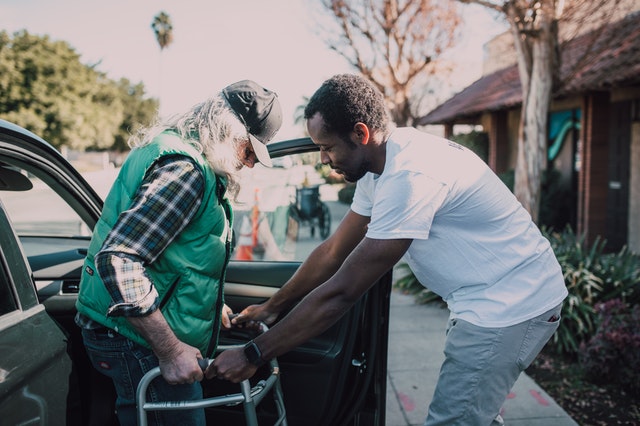Years ago, whilst undertaking consultancy work with the charity My Home Life, I was struck by the words used by the then CEO, Julienne Meyer, during a presentation: “Care homes should not be islands of the old.”
Those words have always remained with me, stressing how vital it is to create and maintain community connections. There are many ways of doing this and this article will focus on volunteering – something I am passionate about as a trainer who delivers Managing Volunteers training as part of my work.
This is a large and complex arena, so I will particularly focus here on the ethics and benefits of involving volunteers in care homes.
Ethics of Volunteering/Volunteers
There are several key ethical issues regarding involving volunteers:
- Volunteer roles should be of benefit to the individual (e.g., an opportunity to use current/develop new knowledge/skills, be meaningful, an opportunity to make friends etc.)
- Volunteering is an opportunity to promote equality, diversity and inclusion
- Volunteering should only be within charity/not-for-profit care organisations – it is perceived by many in the volunteering world as unethical and exploitative for volunteers to be used for profit
- Volunteering should never be confused with ‘paid work’ or contractual roles in law. Therefore, there should be Volunteer Role Descriptions, not Volunteer Job Descriptions etc.
- Volunteers need and deserve appropriate, regular support/supervision structures
- Volunteers should be reimbursed for proven, reasonable out-of-pocket expenses (e.g., travel, meals) upon receipts. Note that giving volunteers an honorarium or a set amount (e.g. £10/$10 for lunch is illegal)
- Volunteers should never be a substitute for paid roles (e.g., undertaking direct care tasks that should be the domain or paid care-workers
Reasons to volunteer
Organisations often fall into the trap of thinking about what volunteers can do for them, rather than the reasons individuals choose to give their time unpaid. Frequently during training, I use the acronym WIIFT – What’s In It For Them. It is vital to understand the main motivators for volunteering:
- Affiliation with the organisation
- Asked personally to help
- Connected to work
- Enjoy type of ‘work’
- Making life changes
- Personal commitment or connection to mission – the ‘cause’
- Want to learn new skills
- Want to meet people
- Want to offer specific, specialist skills/expertise
David McClelland’s motivation management theory simplifies these as:
- This is crucial for volunteer-involving organisations to understand. For example:
- Sujata wants to volunteer in a care home because her father had dementia
- Abayomi wants to volunteer as (due to mental health issues) they have been out of paid employment for some time and keen to develop new skills
- MoneyBank plc, has a Corporate Social Responsibility policy that encourages staff to volunteer for local projects. MoneyBank plc staff are offering a week of their time to create a dementia-friendly, multi-sensory garden for a local care home
- Katy is a musician and wants to run music workshops for care home residents.
Therefore, wherever possible, volunteer roles and volunteering projects should be flexible and tailored to the skills and interests of the prospective volunteer(s). This might involve creating a specific role for a volunteer such as Katy above, rather than trying to fit the person in with what you want. It might also involve creativity in designing short-term projects for which individuals/organisations can support and engage with.
It is only after looking at WIIFT, that we can explore WIIFM: What’s In It For Me – the benefits for care homes in involving volunteers. These include:
- Connecting with the local community
- Enabling new and greater opportunities for people living in your care-setting to engage with others, chat and make meaningful connections
- Facilitating a greater range of activities and things to do
- Maia is a local artist who can work one-to-one with residents who are interested in arts activities
- Four volunteers from the local youth group visit monthly to find out about the life histories of people living in the care home and help them to access the internet to look up local history online
- Opportunity to find befrienders for specific people living in your care-setting
- Joe used to love riding motorbikes and you target your volunteer recruitment to a local motorcycling club – Angus now visits Joe regularly with photos of his motorbike and recently took Joe to a vintage motorbike show)
- Volunteers can free up staff time, so the team can get on with other things
- Elaine comes in to help with mealtimes and chat with Marion, which enables staff to spend more time with Mrs Abdul, who needs greater assistance with eating
These are just a few examples of how involving volunteers can enhance your service, help maintain community connections and improve the quality of life of people with dementia and others you support.
Properly involving and managing volunteers requires skill, time and effort – it also needs resourcing (e.g. staff time to co-ordinate, expenses, volunteer training etc.). It can’t be done ‘on the cheap.’
Nevertheless it can bring infinite benefits and possibilities if we take a creative approach. There is so much more that could be said, if space allowed.
However, if you would like to find out more or I can support you in any way, why not email me at mike@meaningfulcarematters.co.uk
I often think of volunteers as superheroines and superheroes. As Mother Teresa once said: “Not all of us can do great things. But we can do small things with great love.”
Involving volunteers can unleash potential for care homes and the people who live in them, to ensure they are no longer ‘islands of the old’ and become thriving communities bringing together people of all ages and backgrounds and making life more meaningful.

Associate Trainer
MCM

